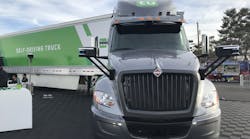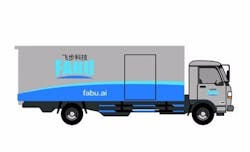TuSimple announced it has raised $95 million funding, based on a pre-money valuation of $1 billion. The new capital investment will be used to fund TuSimple’s commercial ramp-up and product development.
With this round, TuSimple will continue to grow its commercial autonomous fleet, which makes daily fully-autonomous deliveries in Arizona, and soon in Texas. The fleet allows the company to earn revenue while validating its Level 4 autonomous system. The company currently is making three-to-five trips per day and will use the money to grow the fleet to more than 50 trucks by June.
“We’re building a fleet that will enable us to validate the technology so we can get to driver-out states at some point in the near future,” Chuck Price, TuSimple’s chief product officer told Fleet Owner. “That fleet is generating revenue for us. We’ve signed 12 customers to date, and that number is growing. The customers have requested confidentiality. But we are making daily runs for revenues.
“We're unique among the truck autonomy companies,” he continued. “We’re the only one developing and actually demonstrating today a Level 4 autonomous system that is full depot to depot, meaning it’s moving on surface streets, through traffic lights, stop signs, over railroad tracks, and driving from the highway to the destination. And from the departure to the highway.”
The investment will also be used to fund critical joint production programs with its OEM, Tier 1, and sensor partners in order to achieve full commercialization.
Asked why TuSimple is at the forefront of autonomous technology in such a competitive industry, Price didn’t mince words.
“Because it’s a really hard problem,” he explained. “Most of them have taken the path of solving the simple problem first because it’s flashy and gets their valuation up fast. In our case we stayed heads down with a goal to build a complete system that not only can be commercialized but is something that the customer buying it can make ready use of.
“If you’re just doing on-highway automation, which many are saying is the low-hanging fruit, you haven’t solved the problem of what happens when you get off the highway. You have to get a driver, and have created a new problem for the fleet because it’s not going to seamlessly integrate. We decided from the outset that we would tackle the hard problem. As a result we didn’t get a lot of the limelight early on, but it allowed us to move past our competitors.”
The $95 million financing was completed in December 2018. It brings TuSimple’s total funding to date to $178 million.
“Autonomous driving is one of the most complex AI systems humans have ever built. After three years of intense focus to reach our technical goals, we have moved beyond research into the serious work of building a commercial solution,” said Dr. Xiaodi Hou, TuSimple’s founder, president and chief technology officer. “We are thankful for the continued support of our investors and partners. This is not only a great sign of confidence in TuSimple, but also for the future of autonomous trucking.”
To support Level 4 driving on complex highway and local streets, the TuSimple has developed a camera-centric perception solution that allows its trucks to see 1,000 meters ahead of the vehicle. The vision range is farther and delivers better visibility than any other autonomous driving system today. This level of performance is essential for autonomous commercial trucks to operate safely at highway speeds, rain or shine.
“We chose from the outset not to base our technology on lidar (a detection system which works on the principle of radar but uses light from a laser) as a primary sensor but on cameras,” Price said. “That decision had a lot of downstream effects that are valuable. In order to do surface streets you need to be able to see laterally long distances, not just forward. Trucks need to clear a long distance. Lidar doesn’t have near the range to do that. Cameras get the range required.”
Meanwhile, another Chinese-founded company that plans to begin testing of automated driving technologies in Arizona in 2019 is Fabu Technology.Fabu aims to “create a new era of intelligent transportation which makes roads safer,” said Angela Suen, head of marketing.
During a recent phone briefing Fleet Owner, company executives said its full-stack of algorithm and software infrastructure will set it apart from other automated technologies and advanced driver assistance systems.
The artificial intelligence and machine learning algorithms lead to far faster reaction times than other companies, Fabu officials said.
In 2017, Fabu began testing a Level 4 system on five light trucks, which traveled a 160-mile route in China daily. So far, they have run about 31,000 miles in all weather conditions, achieving a camera and sensor perception range of 650 feet and obstacle detection accuracy of 97 percent.
While that testing ramps up, the company also plans to conduct similar programs in the United States using vans and heavy-duty trucks.
Suen said interest in autonomous driving among trucking and logistics companies in China is “really high,” as that nation also wrestles with a shortage of qualified truck drivers. The long stretches of highway in China makes it an attractive place to run automated technologies, though the overall maturity of the market lags behind the United States.




